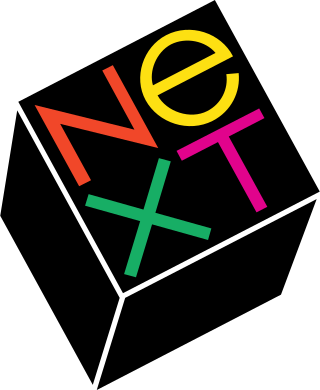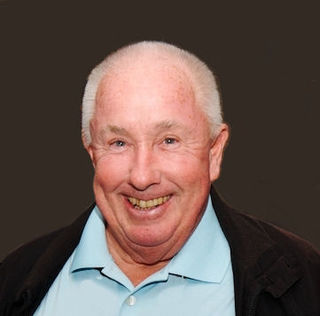
Apple Inc. is an American multinational corporation and technology company headquartered in Cupertino, California, in Silicon Valley. It designs, develops, and sells consumer electronics, computer software, and online services. Devices include the iPhone, iPad, Mac, Apple Watch, Vision Pro, and Apple TV; operating systems include iOS, iPadOS, macOS, watchOS, tvOS, and visionOS; and software applications and services include iTunes, iCloud, Apple Music, and Apple TV+.

NeXT, Inc. was an American technology company headquartered in Redwood City, California that specialized in computer workstations for higher education and business markets, and later developed web software. It was founded in 1985 by CEO Steve Jobs, the Apple Computer co-founder who had been forcibly removed from Apple that year. NeXT debuted with the NeXT Computer in 1988, and released the NeXTcube and smaller NeXTstation in 1990. The series had relatively limited sales, with only about 50,000 total units shipped. Nevertheless, the object-oriented programming and graphical user interface were highly influential trendsetters of computer innovation.

Mac OS X 10.0 is the first major release of macOS, Apple's desktop and server operating system. It was released on March 24, 2001, for a price of $129 after a public beta.
The Apple Store is a chain of retail stores owned and operated by Apple Inc. The stores sell, service and repair various Apple products, including Mac desktop and MacBook laptop personal computers, iPhone smartphones, iPad tablet computers, Apple Watch smartwatches, Apple TV digital media players, software, and both Apple-branded and selected third-party accessories.
MkLinux is an open-source software computer operating system begun by the Open Software Foundation Research Institute and Apple Computer in February 1996, to port Linux to the PowerPC platform, and Macintosh computers. The name refers to the Linux kernel being adapted to run as a server hosted on the Mach microkernel, version 3.0.

The Macintosh Performa is a family of personal computers designed, manufactured and sold by Apple Computer, Inc. from 1992 to 1997. The Performa brand re-used models from Apple's Quadra, Centris, LC, Classic, and Power Macintosh families with model numbers that denoted included software packages or hard drive sizes. Whereas non-Performa Macintosh computers were sold by Apple Authorized Resellers, the Performa was sold through big-box stores and mass-market retailers such as Good Guys, Circuit City, and Sears.

Fry's Electronics was an American big-box store chain. It was headquartered in San Jose, California, in Silicon Valley. Fry's retailed software, consumer electronics, household appliances, cosmetics, tools, toys, accessories, magazines, technical books, snack foods, electronic components, and computer hardware. Fry's had in-store computer repair and custom computer building services.

A Macintosh clone is a computer running the Mac OS operating system that was not produced by Apple Inc. The earliest Mac clones were based on emulators and reverse-engineered Macintosh ROMs. During Apple's short lived Mac OS 7 licensing program, authorized Mac clone makers were able to either purchase 100% compatible motherboards or build their own hardware using licensed Mac reference designs.
Steve Capps is a pioneering American computer programmer and software engineer, who was one of the original designers of the Apple Macintosh computer and co-designers of the Finder in the 1980s. He also led development of the Apple Newton PDA and designed music software such as SoundEdit, before developing user interface (UI) designs for Microsoft's Internet Explorer and online/mobile payment systems.

A Hackintosh is a computer that runs Apple's Macintosh operating system macOS on computer hardware that is not authorized for the purpose by Apple. This can also include running Macintosh software on hardware it is not originally authorized for. Benefits of "Hackintoshing" can include cost, ease of repair and piecemeal upgrade, and freedom to use customized choices of components that are not available in the branded Apple products. macOS can also be run on several non-Apple virtualization platforms, although such systems are not usually described as Hackintoshes. Hackintosh laptops are sometimes referred to as "Hackbooks".

Apple Inc., originally Apple Computer, Inc., is a multinational corporation that creates and markets consumer electronics and attendant computer software, and is a digital distributor of media content. Apple's core product lines are the iPhone smartphone, iPad tablet computer, and the Macintosh personal computer. The company offers its products online and has a chain of retail stores known as Apple Stores. Founders Steve Jobs, Steve Wozniak, and Ronald Wayne created Apple Computer Co. on April 1, 1976, to market Wozniak's Apple I desktop computer, and Jobs and Wozniak incorporated the company on January 3, 1977, in Cupertino, California.

TigerDirect was an El Segundo, California-based online retailer dealing in electronics, computers, and computer components. The company was previously owned by Systemax, which is known for its acquisitions of the intellectual property of the defunct U.S. retail chains Circuit City and CompUSA and relaunching them as online retailers. The two brands were subsequently shuttered in late-December 2012 and consolidated into the TigerDirect site.

Paul Terrell is an American businessman. In December 1975, he founded Byte Shop, the first personal computer retailer shop. He helped popularize personal computing to the hobbyist and home computing markets, and was the first retailer to sell an Apple Computer, the Apple I.
Computer Literacy Bookshops was a local chain of bookstores selling primarily technical-oriented books in Northern California. It was founded in 1983 in Sunnyvale, California, where its concentration in technical books fit well with its Silicon Valley customer base.
A Macintosh User Group (MUG) is a users' group of people who use Macintosh computers made by Apple Inc. or other manufacturers and who use the Macintosh operating system (OS). These groups are primarily locally situated and meet regularly to discuss Macintosh computers, the Mac OS, software and peripherals that work with these computers. Some groups focus on the older versions of Mac OS, up to Mac OS 9, but the majority now focus on the current version of Mac operating system, macOS.

FileWare floppy disk drives and diskettes were designed by Apple Computer as a higher-performance alternative to the Disk II and Disk III floppy systems used on the Apple II and Apple III personal computers. The drive is named Apple 871 in service documentation, based on its approximate formatted storage capacity in kilobytes, but is most commonly known by their codename Twiggy, after the famously thin 1960s fashion model named Twiggy.

Microsoft Store was a chain of retail stores and is an online shopping site, owned and operated by Microsoft and dealing in computers, computer software, and consumer electronics.
Haddock Corporation is an American consumer electronics and information technology consulting business based in Wichita, Kansas, which operated four Haddock Computer Center retail locations in Kansas, Oklahoma, and Iowa. Founded as a software company, Haddock has been an Apple-authorized dealer and computer repair shop since 1984, the year the Macintosh computer was released. Company founder and CEO Richard Haddock served on Apple's reseller advisory board for over ten years. He is a member and one of the founders of the Apple Specialist Marketing Corporation.
The following outline of Apple Inc. is a topical guide to the products, history, retail stores, corporate acquisitions, and personnel under the purview of the American multinational corporation Apple Inc.

Dayna Communications, Inc., was a privately-held American computer company, active from 1984 to 1997 and based in Salt Lake City, Utah. It primarily manufactured networking products for Apple Computer's computing platforms, including the Macintosh, PowerBook and Newton. In 1997, the company was acquired by Intel for nearly $14 million.












